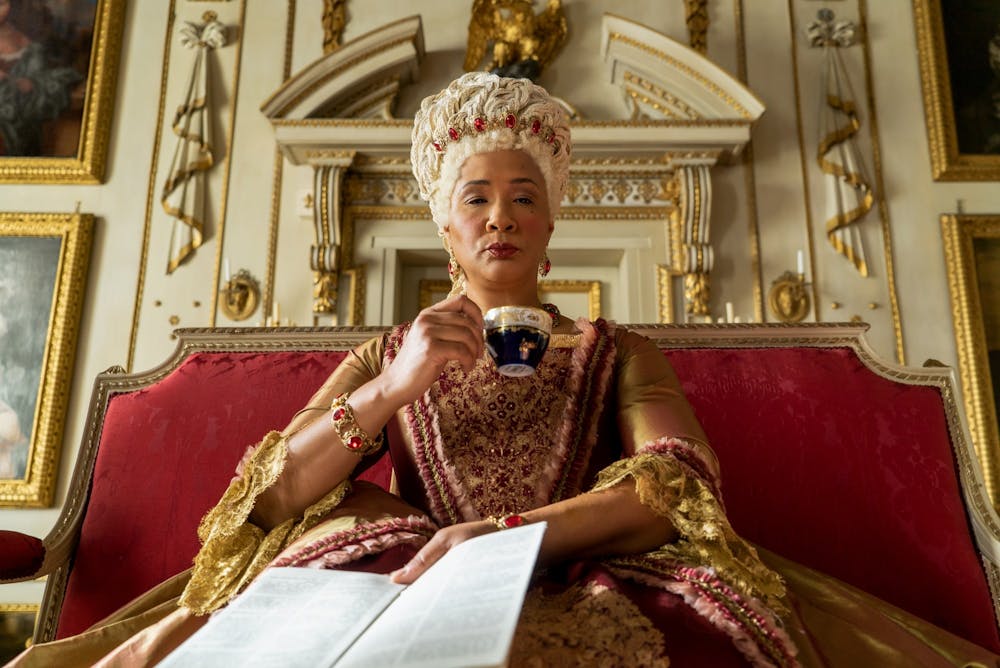Netflix’s hit show “Bridgerton” has fans entranced by its beauty once again with the recent release of its second season. In its first week alone, season two brought in more than 251 million hours viewed.
Spoiler warning: I can’t write about “Bridgerton” without gushing over it and consequently oversharing plot points. If you haven’t watched it yet and want to, don’t read ahead! Experiencing “Bridgerton” on screen is worth the wait.
Like other fans, my love for “Bridgerton” probably outweighs my love for any other show. My obsession might be unhealthy, but I can’t help the grasp that this season’s romance between Kate Sharma and Anthony Bridgerton has on me.
Despite my absolute enthrallment with the show, I can confidently say that if this period drama held entirely true to its setting — the Regency period of the early 19th century — I wouldn’t like it as much as I do.
“Bridgerton” would have been a failure had the writers and directors included the cruel racism and sexism of history. By putting a modern spin on the past and creating an environment that lacks exclusion, this television series establishes its rightful and successful place in entertainment.
Related: [OPINION: The decline of live TV is depressing]
Had “Bridgerton” clung to historical accuracy, it would have left out the fan-favorite portrayal of characters like Simon Basset, the Duke of Hastings.
The Duke is played by Regé-Jean Page, a Black English actor who won a NAACP Image Award for Outstanding Actor in a Drama Series for his “Bridgerton” performance. Page’s role brought him to a well-deserved new level of popularity and esteem in the entertainment world.
If “Bridgerton” prized historical accuracy over modern representation, this wouldn’t have been possible. The relationship between Simon and Daphne Bridgerton that initially captivated all viewers would have most definitely been subpar had “Bridgerton” wanted an all-white, “historically accurate” cast. This romance was so special because of its diversity and truth.
Other notable portrayals that would have been impossible are Kate and Edwina Sharma, sisters from India, and Lady Danbury, played by Adjoa Andoh, a Black British actress.
“Bridgerton” can still be a historical piece without including the dark parts of history. We don’t have to relive or re-enact the past to acknowledge it and learn from it.
When it comes to its characters Eloise Bridgerton and Penelope Featherington, “Bridgerton” most certainly learned from modern-day feminists to put a spin on the 19th century — and it’s wonderful.
Eloise is allowed to be a strong-willed feminist, when in reality, the harsh sexism that existed in the time period wouldn’t have allowed this so openly.
Related: [OPINION: Disney is successfully shifting the narrative on what it means to heal]
While I’m sure some form of feminism did exist, despite the series taking place before the first wave of feminism in the latter half of the century, Eloise still stands out. She is daring. She isn’t afraid to be a critic of the courting season, and she isn’t afraid to tell men how it is. In the second season, she goes as far as attending political meetings and befriending male revolutionary Theo Sharpe.
Eloise’s best friend, Penelope, is also a young woman of bold character. Penelope, under the guise of Lady Whistledown, writes and publishes a weekly social pamphlet detailing the gossip of the season. Though her boldness is behind the scenes, it still has space to exist.
Had “Bridgerton” kept true to the 19th century, a lady of the aristocracy using her intellect and publishing her findings for the rest of London to read would have been nearly impossible and highly condemnable in an extremely gendered society that valued men.
In many of our American minds, we see a disregard of history as a pass for racism and sexism. But “Bridgerton” does the exact opposite of that, and it works in a beautifully entertaining way.
Elizabeth Valadez (she/her) is a freshman studying English and political science with a minor in Spanish. She is a member of Chi Alpha.






